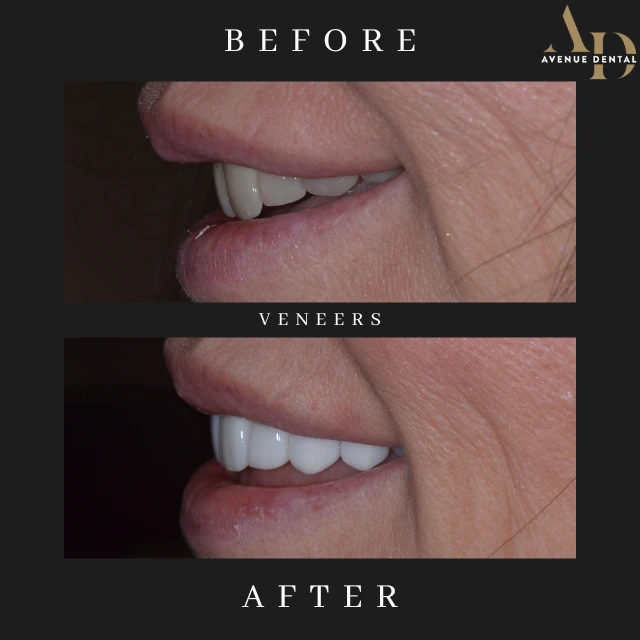Smile with confidentDental Veneers Leamington Spa
Gleaming Smile
Avenue Dental - Leamington Spa
What are permanent teeth veneers?
Teeth veneers can be used to significantly improve the appearance of your smile. They work by applying thin pieces of ceramic or porcelain material to the surfaces of your existing teeth.
Veneers are often used in cases where traditional orthodontics have not achieved the results you’re looking for, or dental bonding has failed to give you the flawless finish you deserve. They can cover up all sorts of imperfections, from misshapen or inconsistently sized teeth to chips, cracks, stains, and abnormal gaps that are stopping you from getting that all-important uniform aesthetic.
Composite vs Porcelain Veneers
Contemporary composite resin veneers have a shorter lifespan than their porcelain counterparts
– often around 3 to 10 years, assuming you look after them as instructed. However, enamel will not need to be removed from your existing teeth in order to fit composite veneers, ensuring there is virtually no discomfort during the procedure and any healthy teeth will retain their natural look and feel.
Porcelain veneers, on the other hand, will often last up to 15 years without any issues. They look exactly like natural teeth, making them the sensible choice for a more permanent solution. We will need to remove around half a millimetre of enamel from each tooth in order to fit porcelain veneers correctly.
Both composite and porcelain veneers can be shaped and polished to look just like your existing teeth, ensuring an attractive and all-natural finish.
6 Key benefits of Dental Veneers
Improved appearance: Veneers can improve the appearance of your teeth by covering up imperfections such as stains, chips, cracks, or gaps, giving you a brighter, healthier smile.
Durability: Veneers are made of strong, durable materials like porcelain or composite resin, which can withstand the wear and tear of everyday use.
Minimal tooth alteration: Veneers require only a small amount of enamel to be removed from the surface of your teeth, which means less alteration of your natural tooth structure compared to other dental procedures.
Easy maintenance: Veneers are easy to maintain with regular brushing and flossing, and they can last for many years with proper care.
Versatility: Veneers can be used to correct a wide range of dental issues, from minor cosmetic flaws to more significant structural problems.
Minimal recovery time: Unlike other dental procedures, such as implants, dental veneers require minimal recovery time. You can typically resume your normal activities immediately after the procedure. However, it is best to check with us before.
FREE Consultation
What to expect from your procedure
In the first instance, we’ll need to make sure you’re a suitable candidate for veneers. Our team will make sure your teeth and gums are largely healthy, and no gingivitis is present. If there are underlying issues, these will need to be dealt with before we can proceed to the next stage.
Once we’re satisfied that dental veneers are your best option, we will take digital scans and images before providing you with a preview of what your smile might look like once your veneers have been fitted. Our ceramists will use the information we have gathered to create bespoke veneers that will be delivered to our practice a week or two after your initial appointment.
If you have opted for porcelain veneers, we will need to prepare the teeth by removing a tiny layer of enamel. We will fit temporary veneers while we’re waiting for your permanent structures to arrive.
On the day of the main procedure, we will use a strong dental adhesive to fix the veneers to your teeth, carefully adjusting the shape of the fixtures throughout the process. This treatment is minimally invasive, but you may feel some soreness or sensitivity around your teeth and gums for up to 2 weeks afterwards.
Enquire today
For more information on dental veneers, contact our private dental practice in Leamington Spa now.


Frequently asked questions
Veneers are thin covers for teeth’s front surfaces that are constructed of porcelain or composite resin and are created to order. They function by altering the colour, shape, size, or length of teeth to improve their appearance.
Veneers may not be suitable for everyone, as each case is unique. A thorough evaluation by us is needed to determine if veneers are appropriate based on factors such as oral health, tooth condition, and patient expectations.
The veneer placement process typically involves several steps, including tooth preparation, impressions, fabrication, and bonding. The entire process can take 1–2 weeks or longer depending on the complexity of the case and the type of veneers used.
We offer alternatives to veneers for improving smile aesthetics which may include teeth whitening, dental bonding, or orthodontic treatments such as braces or clear aligners, depending on the specific dental concerns and desired outcomes.
Porcelain veneers are highly resistant to staining or discolouration compared to composite veneers, which may be prone to slight discolouration over time. Avoiding staining substances such as tobacco, coffee, and red wine, and maintaining good oral hygiene can help prevent staining.
The veneer placement process is generally considered to be painless, as local anaesthesia is usually administered to numb the area. Some patients may experience mild sensitivity or discomfort after the procedure, which typically subsides within a few days.
Our client reviews

Get in Touch
Other services
Book A Consultation
Avenue
Opening Hours
Tue: 8:30am - 5:30pm
Wed: 8:30am - 5:30pm
Thu: : 8:30am - 5:30pm
Fri: 8:30am - 4:30pm
Sat: Appointment Only
Sun: Closed
Avenue
Opening Hours
Tue: 8:30am - 5:30pm
Wed: 8:30am - 8pm
Thu: : 8:30am - 5:30pm
Fri: 8:30am - 4:30pm
Sat: Appointment Only
Sun: Closed
Follow Us
Copyright All Rights Reserved © 2022 – Avenue Dental Practice
Copyright All Rights Reserved © 2022 – Avenue Dental Practice



















































































































